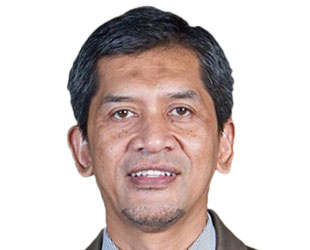Speakers

Chief Executive Officer
Ordnance Survey
United Kingdom

Director General
National Space Agency
Malaysia

Director of Spatial Planning and Land, National Development Planning Agency (BAPPENAS), Indonesia

Deputy Head, Information Systems and Technologies, French Geological Survey (BRGM), France

Country Director
World Resource Institute
Indonesia

Director General, Geospatial Information Department, Geospatial Information Authority, Japan

Director
Malaysian Centre for Geospatial Data Infrastructure (MaCGDI), Malaysia

President
GPC Group
UAE

Head of Geospatial Data
Group Technical Data
PETRONAS, Malaysia

Director – Market Intelligence & Policy Advocacy
Geospatial Media and Communications

Director of Survey (Cadastre), Department of Survey and Mapping, Malaysia

Managing Director, Location Intelligence Solutions
Pitney Bowes, USA

Climate and Forests Senior Manager
World Resource Institute
Indonesia

Sales Engineer
FARO Singapore
Singapore
OVERVIEW
The value of geospatial technology lies in its ability to manage and integrate data, as well as in its analytical tools that sharpen decision-making, that ultimately save time and money. The continuing Asian (and global) economic uncertainty has brought major focus on productivity to the region, which serves as a great opportunity to raise the profile of Asian geospatial industry.
Legislative approach to bring market-oriented policies and enabling users to capitalize on geospatial technology will be an important growth driver for national economies. The rise of social media and Internet, too, shall continue to fuel up interest in location technology from consumer, which are now driving and seeding development in the industry.
The seminar will focus on the socio-economic value of geospatial technology in national economy and strategy for harnessing the value for national and regional development. It will target 100+ leaders from all parts of the geospatial ecosystem – policymakers, adopters/users, entrepreneurs, investors, and researchers to discuss innovative new ideas, as well as to explore the pathway that can further expand the outreach of geospatial value in national economy.
This seminar is by invitation only. If you’re interested to attend, kindly write to sarah@geospatialmedia.net for an invitation. Limited seats available!
SEMINAR STRUCTURE
Session I: Critical role of Geospatial Infrastructure in Driving National Economy
Geospatial data plays a crucial role in the decision making process and planning efforts across a broad range of key economic areas, ultimately leading to growth in the economy. Ease of accessing, sharing and using the data, form the core of geospatial infrastructure. This is dependent on the available datasets, thematic layers, data dissemination channels, platforms and portals. The session will discuss the critical role of geospatial infrastructure in driving national economy from the perspective of national SDI agencies, economic planning agencies, user enterprises and industry.
Session II: Policy Intervention for Collaboration, Partnerships and Information Sharing
A progressive policy framework for the industry not only facilitates easy adoption and use of geospatial technologies, but also supports the development of an efficient geospatial data infrastructure. A dynamic policy framework, through the establishment of common protocols, policies, standards, etc., serves as a driving force for sustainable collaboration, partnerships and information sharing. The session will bring together policy-makers and user enterprises to discuss the need for policy intervention for socio-economic value of geospatial information, which can be optimized for national and regional development.
Session III: Economic Value and Impact of Geospatial
Geospatial technology, information, and services, have been addressing some of the major priorities of nations, such as increasing agricultural productivity, improving asset management, reducing water leakage, saving construction cost, and many others. The value-added productivity across industries, and the cost and time saved, are indirectly enabling GDP growth.
Regional economic planning agencies will share their strategy in utilizing geospatial technology across key economic areas. Users from key areas will also share their first-hand experience on the benefits of geospatial technology.
TENTATIVE SCHEDULE
21 August 2017
TARGET AUDIENCE
- National Geospatial Agencies
- Economic Planning Agencies
- ICT Agencies
- Statistical Agencies
- User Enterprises
- Research Institutions
- Geospatial Companies
CONTACT
Geospatial Media and Communications Sdn Bhd
4.17, Level 4, Wisma Central, 147 Jalan Ampang, 50450 Kuala Lumpur, Malaysia
Tel: +60 3 2181 7669, Fax: +60 3 2181 7661,
Email: info@geosmartasia.org

